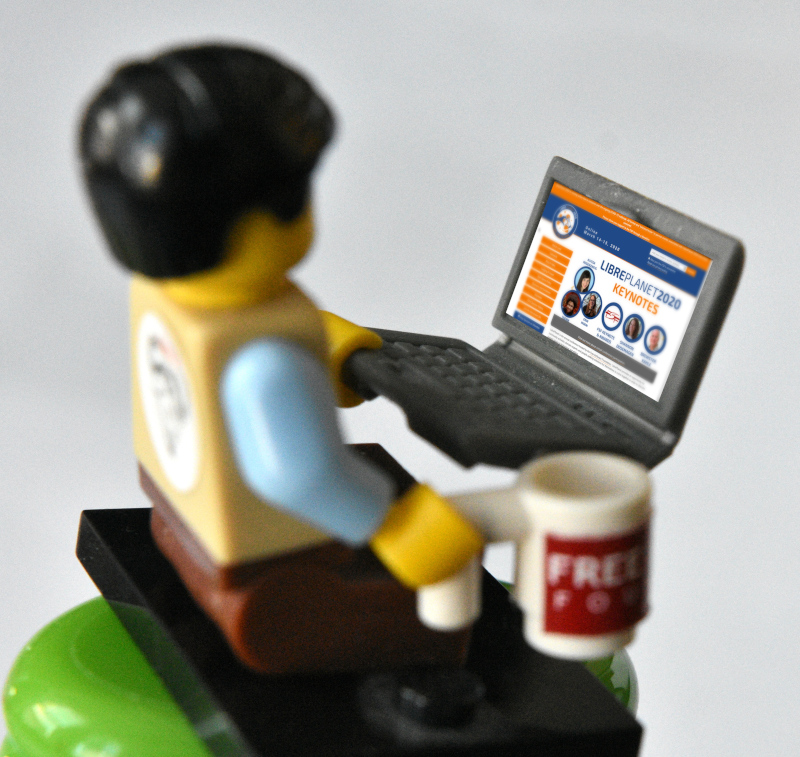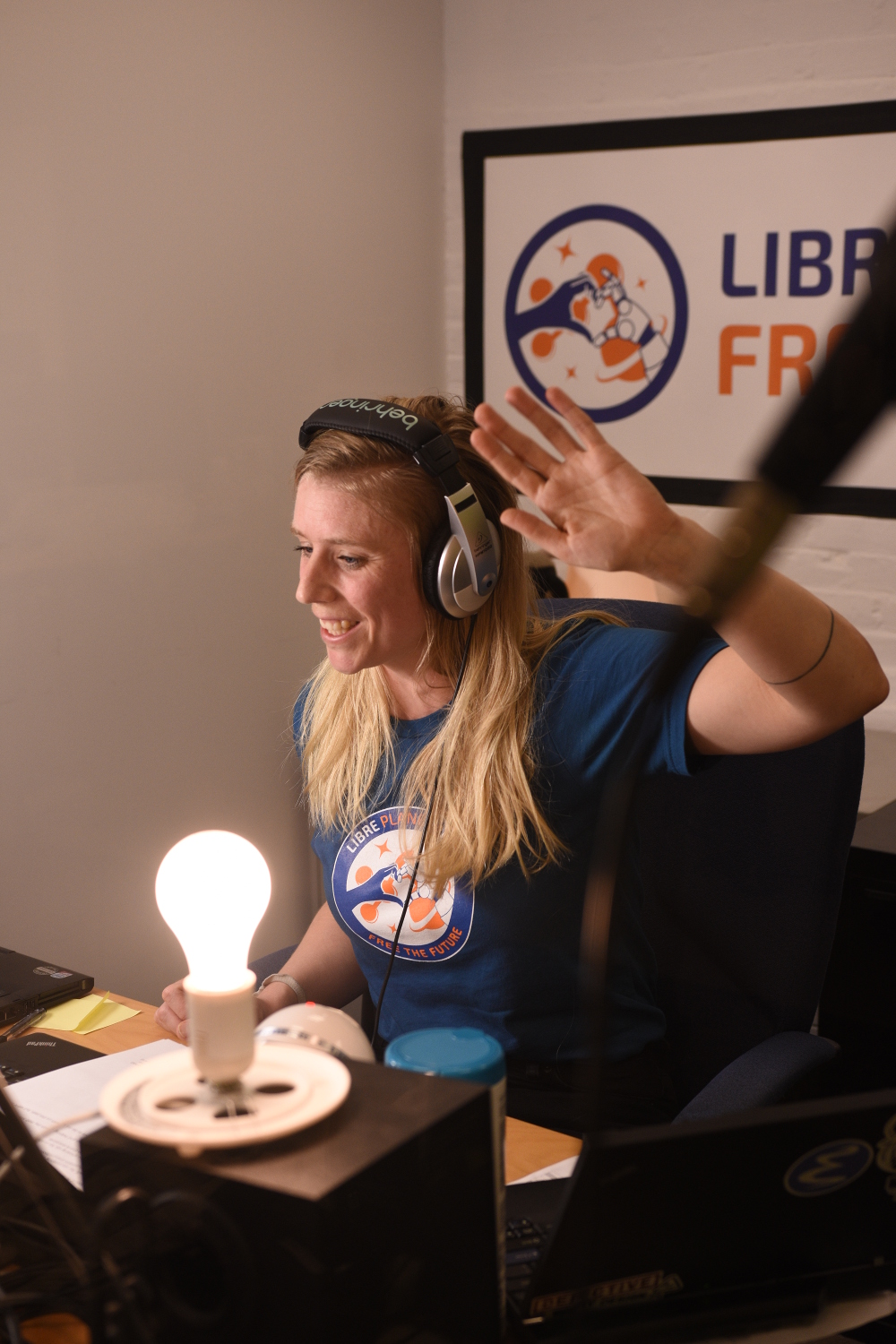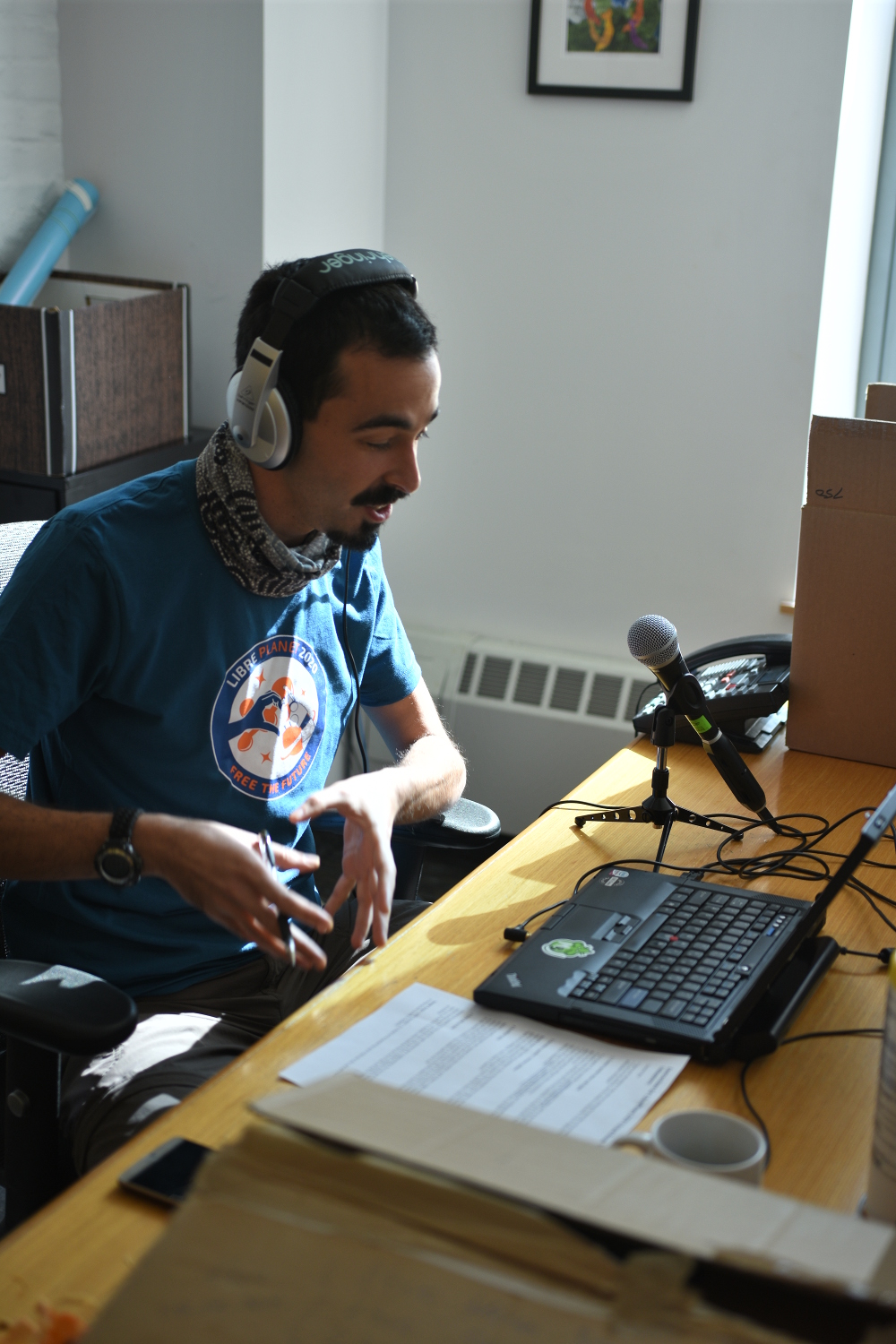| Please consider adding [email protected] to your address book, which will
ensure that our messages reach you and not your spam box.
Read and share online: https://www.fsf.org/blogs/community/libreplanet-2020-online-second-day-of-the-conference-closes-on-a-high-note
Dear Free Software
Supporter,
The second day of the unstoppable LibrePlanet 2020 conference
showcased more speakers and contributors making great strides in the
movement.

This followed on the heels of the previous day's
presentation of the Free Software Awards to Let's Encrypt, Jim
Meyering, and Clarissa Lima Borges, along with Free Software
Foundation (FSF) executive director John Sullivan's announcement of a
new FSF-sponsored working group to document and address the problem of
proprietary communication tools. Just like the first day, the FSF
coordinated with remote speakers and viewers from around the world via
a fully free streaming setup which, while not without its
technical challenges, proved that putting on a high quality conference
using only free software is indeed possible. And in a look into the
future of LibrePlanet itself, FSF program manager Zoë Kooyman
announced the FSF's plans to create a LibrePlanet Community Council,
which could provide input on matters at the heart of the conference's
organization.
Appropriate to the conference theme of "Free[ing] the Future," Shannon
Dosemagen kicked off day two of the conference with her talk "For us,
by us: Free technology, community science, and the pursuit of
environmental problem solving." In a prerecorded talk delivered to the
conference, she speculated about free software's ability to lend
assistance to community science efforts aiming to address
environmental concerns. Drawing from her work with Public Lab, a
recipient of the 2017 Free Software Award for Projects of Social
Benefit, Dosemagen used the 2010 BP oil disaster as a lens to view the
progress of free technology for environmental monitoring. She then
joined the conference remotely via Jitsi to take questions from a
large audience in the LibrePlanet IRC channel on Freenode.

Following Shannon was a presentation connecting the free software
movement with Mahatma Gandhi's Charkha movement, delivered by longtime
free software activist and Unmukti Technology founder Nishant Sharma.
Sharma was the first speaker that day to deliver a live talk and Q&A
session from a remote location. Drawing parallels between the free
software movement and Gandhi's method of political organization that
prioritized self-sufficiency, Sharma discussed how the principles of
the Charkha movement and the principles of the free software movement
could mutually inform one another, creating the "Gandhian way to
freedom and privacy." Also in this block was Lex Pan Law founder McCoy
Smith's update on where the free software movement currently stands in
its fight to end software patents. As the mere existence of software
patents poses a threat to the continued success and longevity of free
software, Smith's comprehensive explanation of recent key legal cases
in the changing judicial interpretation of software patents was a
great help to both newcomers and longtime veterans of the fight for
user freedom.
"Community" is a concept we often highlight in discussions of free
software, but there are certain geographic and national contexts in
which adapting our work to every community becomes a challenge. How do
we, as free software contributors, approach communities where more
thank 25 different languages are spoken? Özcan Oğuz and Alper Atmaca
from Özgür Yazılım Derneği addressed precisely this question,
detailing their work translating free software materials into the wide
variety of Anatolian languages, including Kurdish, Zazaki, Lazuri, and
Homshetsi. Before their work, many of these communities were unable to
use any type of software in their own language, let alone access
documentation. Oğuz, who delivered the session remotely, and Atmaca,
who was present in the FSF office, detailed their impressive work to
localize GNOME, Firefox, and other core GNU/Linux programs into all of
these languages.
While most of the conference focused on free software's moving
forward, developer Dennis Payne looks back. In a session titled "Free
software game restoration," Payne emphasized video games' importance
to the cultural and historical record, and highlighted the problem of
older free software games that no longer run on modern GNU/Linux
systems. By utilizing our freedom to study and modify these early
games, we can ensure that they're able to be played and enjoyed for
years to come.

The movement to free the future was brought much closer to home with
Sean O'Brien's presentation "GNU Health Embedded: An introduction,"
which gave an overview of recent updates to a version of the GNU
Health project designed to work on pocket-sized computers. Targeting
these platforms enables the program to be deployed into a wide variety
of different environments, and optionally, defend its users' privacy
through use of the Tor network. O'Brien gave several case scenarios
for GNU Health's use in embedded environments while, in another
session, recent Free Software Award winner for Outstanding New
Contributor Clarissa Lima Borges explored the accessibility challenges
non-technical users face when first coming to free software. Drawing
from her work on improving user experience in GNOME, Borges's talk
told the "love story" between free software and its users, and
emphasized how relatively trivial changes to a program's visual design
can go a long way in improving the user experience for all.
An online conference is nothing without some technical glitches and
resolves. Speaker der.hans, whose talk was interrupted in the morning,
returned in the afternoon to consider the future from a social media
angle with his talk "Fediverse: Decentralized social networking and
services." Der.hans gave users who may not be familiar with the
federated Web's core concepts a crash course into popular free
software server software like Mastodon, PeerTube, and Pixelfed.
Following O'Brien in the "Freedom" room of the conference were Devin
Ulibarri and Walter Bender of Sugar Labs, who gave an overview of the
project's developers, teachers, and students coming together to work
on educational free software projects. Sugar Labs's application of
this community effort is widely varied, ranging from hacking on
introductory, visual programming languages to contributing to critical
components of the Sugar OS distribution of the GNU/Linux operating
system. This free spirit of collaboration continued on through Lori
Nagel's talk on the reliance free software games have upon free
cultural visual assets, the complex 2D drawings and 3D models that
often have entire teams working on them to deliver a memorable
experience. Notably, the focus of Nagel's talk was easy ways for those
who enjoy free software games to start contributing to their favorite
one, even if they currently lack programming skills.
In the "Patriot" room of the conference, developer Charles Lehner gave
viewers a summary of the Secure Scuttlebutt project, an
"offline-first" social networking protocol that allows its users to
disconnect from the wider "web" and resync at any time -- making it
ideal for those who live the nomadic, "solarpunk" lifestyle Lehner
went on to describe. But things in the movement aren't always fun and
games, and they aren't always especially clear either. Patrick Masson
brought participants back into the "Grand" room of the virtual
conference, delivering his talk "The Four Free-ums." As the movement
is growing each day and attracts attention from both curious onlookers
and big business, Masson reiterated the need for free software to
stick to its founding principles, and what sets of tests successful
free projects may have to overcome. He discussed how recent, "novel"
takes on software freedom from outsiders at best leverage, or at
worst, exploit the success of the four freedoms. This "free-washing"
behavior is exactly what we recently called Microsoft out on with our
Upcycle Windows 7 campaign.

Just like any other social justice movement, the push for software
freedom has its share of conflicts and interpersonal rifts between
users and different projects. A past LibrePlanet speaker and free
software activist, Katheryn Sutter, addressed these issues in a
presentation entitled "Community healing: Re-establishing norms,
trust, and truth after crises." Using her years of experience in
grassroots organizations, Sutter shed light on how free software
activists can learn from the history of other political causes. In the
"Patriot" room the topic presented on was more "hands-on," with Marc
Jones and Robert Read giving viewers a demonstration of devices that
extend free software principles into the world of public invention
projects.
In his closing keynote, "Locking the Web open: A decentralized web
that can operate as free software does," Internet Archive founder
Brewster Kahle revisited the explosive growth of the Internet over the
first thirty years of its existence, and emphasized the importance of
ensuring its original values are encoded into the framework of the Web
itself. Kahle highlighted user privacy, free speech, and free access
to knowledge as the key concepts that drove its original growth. In a
big win for freedom, Kahle also announced that the Internet Archive
has placed all the JavaScript that it has written itself and
which it distributes to users visiting the Wayback Machine under the
AGPLv3. "The Internet Archive generally distributes software
under the GNU Affero General Public License (AGPL), but has released
some software under other licenses," Kahle said. "In preparation for
LibrePlanet 2020, we have declared the AGPLv3 license on JavaScript
used on archive.org, web.archive.org (the Wayback Machine), and
openlibrary.org. Live free!"
As you have likely noticed, LibrePlanet 2020's second day was jammed
full with practical free software knowledge and inspiring calls to
further action and improvement, enough so that users in the IRC
conference rooms repeatedly expressed their anticipation of the final
recorded videos. We couldn't agree more, and are working on getting
the sessions transcoded and finalized as fast as we can! To help make
these talks accessible for everyone, we're dependent on volunteer
transcribers. Please send in any talk transcriptions to
[email protected]. It's been an exhilarating trip to turn a
conference cancellation into a successful virtual conference in such a
short amount of time, and all of us at the FSF deeply appreciate our
speakers' and participants' support and enthusiasm for the future
of free software. We'll see you at LibrePlanet 2021!
Stay well!
The LibrePlanet Team
Photo credits: Ruben Rodriguez, © 2020, Free Software Foundation, Inc.
Licensed under Creative Commons Attribution 4.0
International license.
|